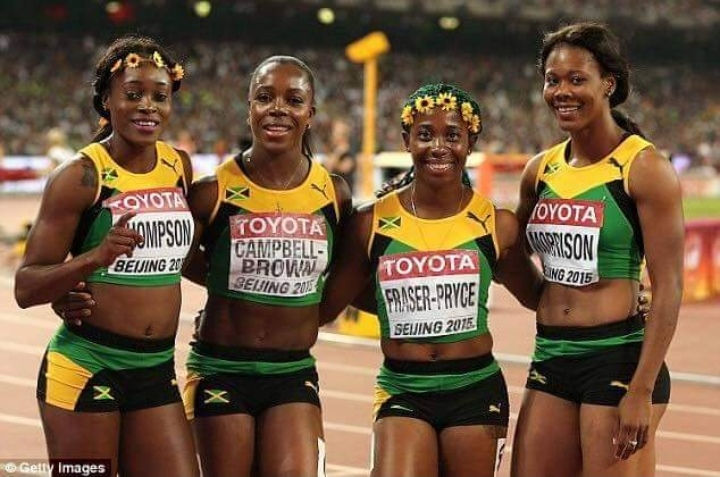Jamaica and Ashanti(Akan), One Blood?
- Think News Online
- May 4, 2020
- 4 min read

I have always understood that Jamaicans are descendants of enslaved Africans from West Africa & Ghana, and Ashanti in particular, but I never realized just how similar our roots run hundreds of years after slavery. As Brazilians in Salvador de Bahia keep the Yoruba roots of tradition & language alive in modern day Brazil, Jamaican Maroons keep the Ashanti (Akan) traditions & language alive in modern day Jamaica.
When Jamaica’s native son Marcus Garvey shouted for Global Africans to return to Africa, many chanted Haile Selassie I &found home & Rastafari roots in Ethiopia while many others celebrated Osagyefo Kwame Nkrumah & found freedom in Ghana. Today’s Ghana boast a significant Jamaican community brought & empowered by Rita Marley & the memory & foundation of Bob Marley & Marcus Garvey. Jamaicans & native Ghanaian Rastas have created their own governing & financial empowerment council that boasts a credit union called the black star line catering to the financial empowerment needs of Rastafarians in Ghana.
When you walk around Ghana you see Jamaica, from reggae music, to dreadlocks & the culture of Rastafari. I had heard about the Kromanti/Kramanti language in Jamaica which was supposed to sound similar to the Akan languages of Ghana, but I became a true believer when I heard it spoken & found many similar words in Ghanaian Akan languages. Jamaicans like Brazilians have never denied their African roots, but have rather embraced it & used it as a sense of power in knowing who they are & where they came from beyond Jamaica’s sugar cane plantations. With more & more talk amongst African nations about offering our Diasporan brothers & sisters free visas & dual citizenships to come back home to their ancestral roots, perhaps we will all get to learn more about our distant relatives.

Many Africans & Diasporans did not know of Haiti‘s history of successful slave rebellion which led them to independence in 1804 even before slavery was abolished in 1807 until the earthquake that brought Haiti new found global press & historical interest, just as many do not know that Jamaican Maroons had their own successful slave rebellion to freedom 50 years before slavery was abolished & long before Toussaint L’Ouverture brought Saint-Domingue out of the shackles of the French & renamed the new land of freed slaves, Haiti. The Maroons of Jamaica have been able to keep their identity & autonomy not only from their former slave masters, but also within Jamaica even til today. The Maroons’ largest town Accompong even has a similar name to Ghana’s Akropong-which is home to one of Ghana’s oldest tribes, the Akuapims & both are ironically located in the hills/mountains of their individual nations. We can not wait nor allow others to tell us our history & to give it to us in small increments as they see fit when knowledge is power & information is available if we truly seek to be empowered by knowledge .
“I raved about how much African aesthetic is infused into Jamaican life. You’d think I was visiting the island for the first time, even though I was born here and have barely set foot anywhere else since that sun-hot Wenesday in 1972…The thing is this; African retentions in our culture sometimes get compartmentalized and thought of in ways that seem distant. Yes, over 90% of Jamaicans are black and are direct desendants of the people who came from West Africa, so when we look at each other we see our ancestry…”

I remember the first time I went to Jamaica right out of college & met up with two Rasta men who befriended me & took care of me & my friend as community elders do in Ghana. The moment they heard I was from Ghana , I automatically became family & was blessed with eating the best jerk chicken I have ever tasted in my entire life even until today. I have eaten a lot of jerk chicken in Jamaica & other places in the world, but this was hands down the best because from the smell, to the serving of it, to the taste, you could see & feel that it came from the love of family in the way that a home cooked meal outshines even the best highly trained chef.
I did not understand back then why these two grown men were so fascinated with asking me every question possible about Ghana & why their desire to go there was so strong until many years later when I witnessed the Jamaican community & influence in Ghana &saw the love that Ghanaians, particularly the youth gave to Jamaican artists who visited & Jamaican citizens who returned back to Ghana to stay because these Ghanaian youth were just as enamored by them & wanted to know everything possible about them & our mutual ancestral global connection. It was truly as Nas & Damian “Junior Gong” Marley put it, distant relatives reuniting on two sides of the Atlantic & getting to know one another again. From Marley, to Tosh, to Sizzla, to Junior Reid, to Buju, to the new generation Marley, Africa & Ghana in particular has always been in the forefront of their life never to take a backseat in heritage or unity! Akwaaba as we continue to keep it strictly Roots!
Credit: Amma Sarfo








Comments